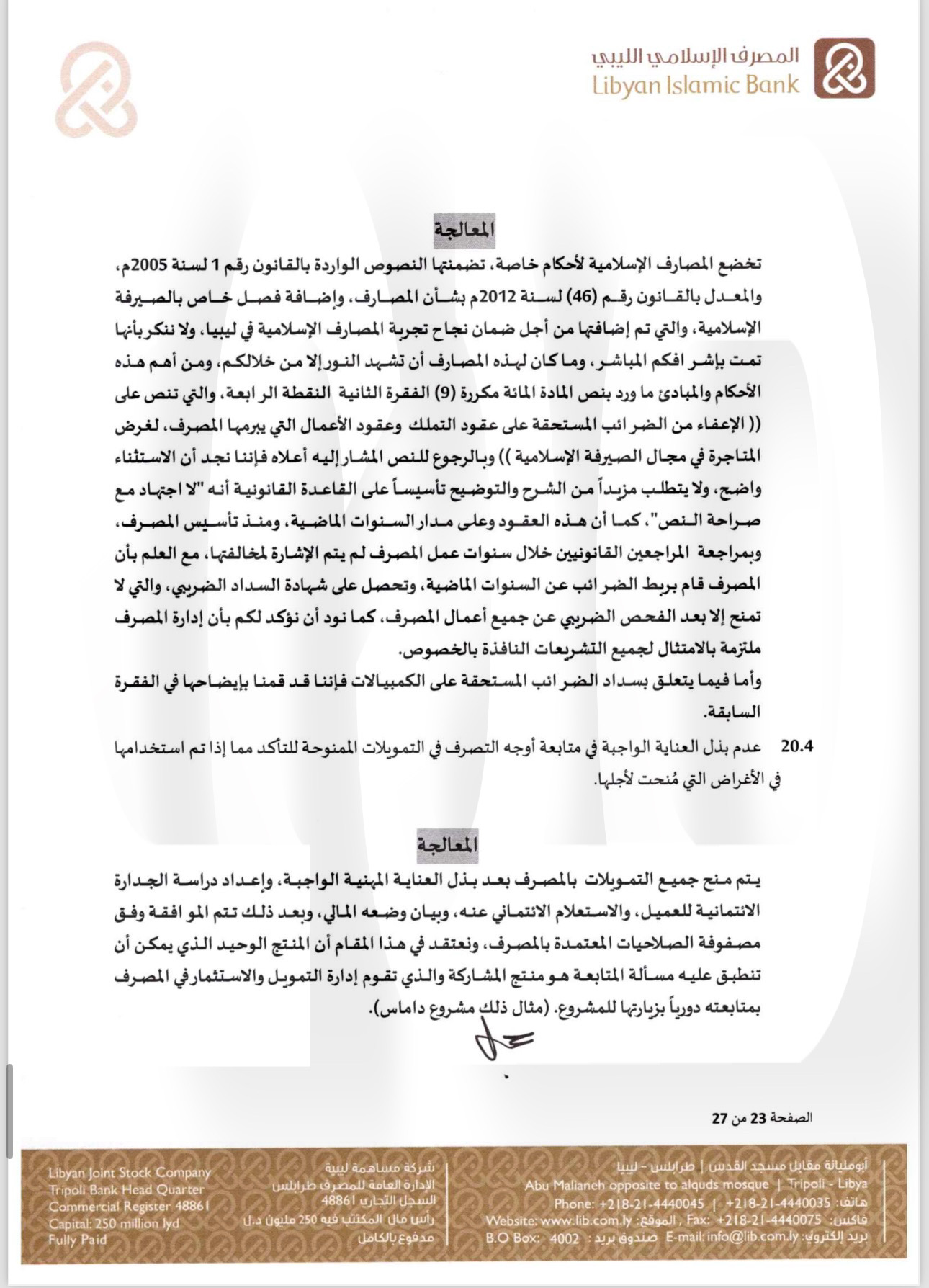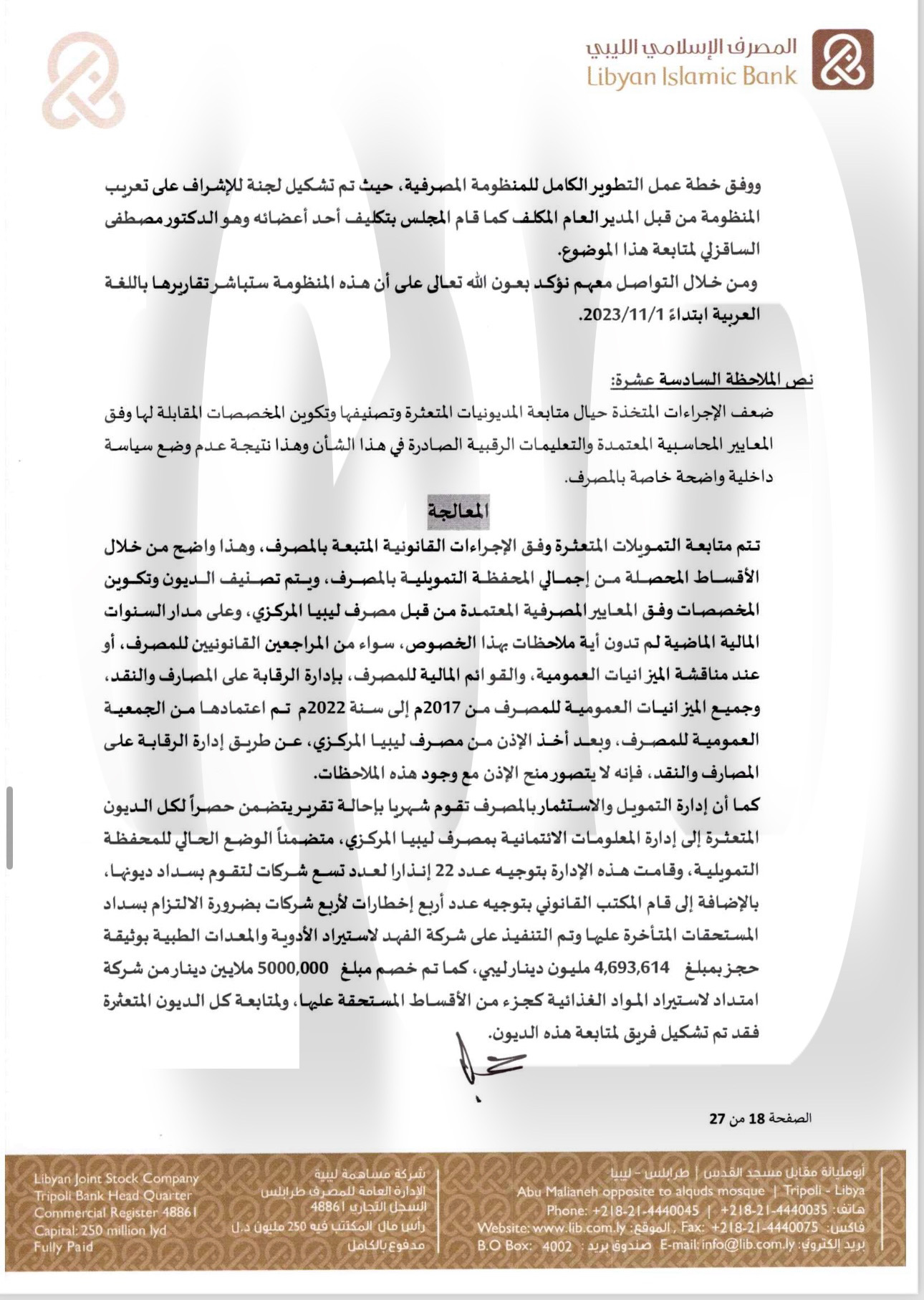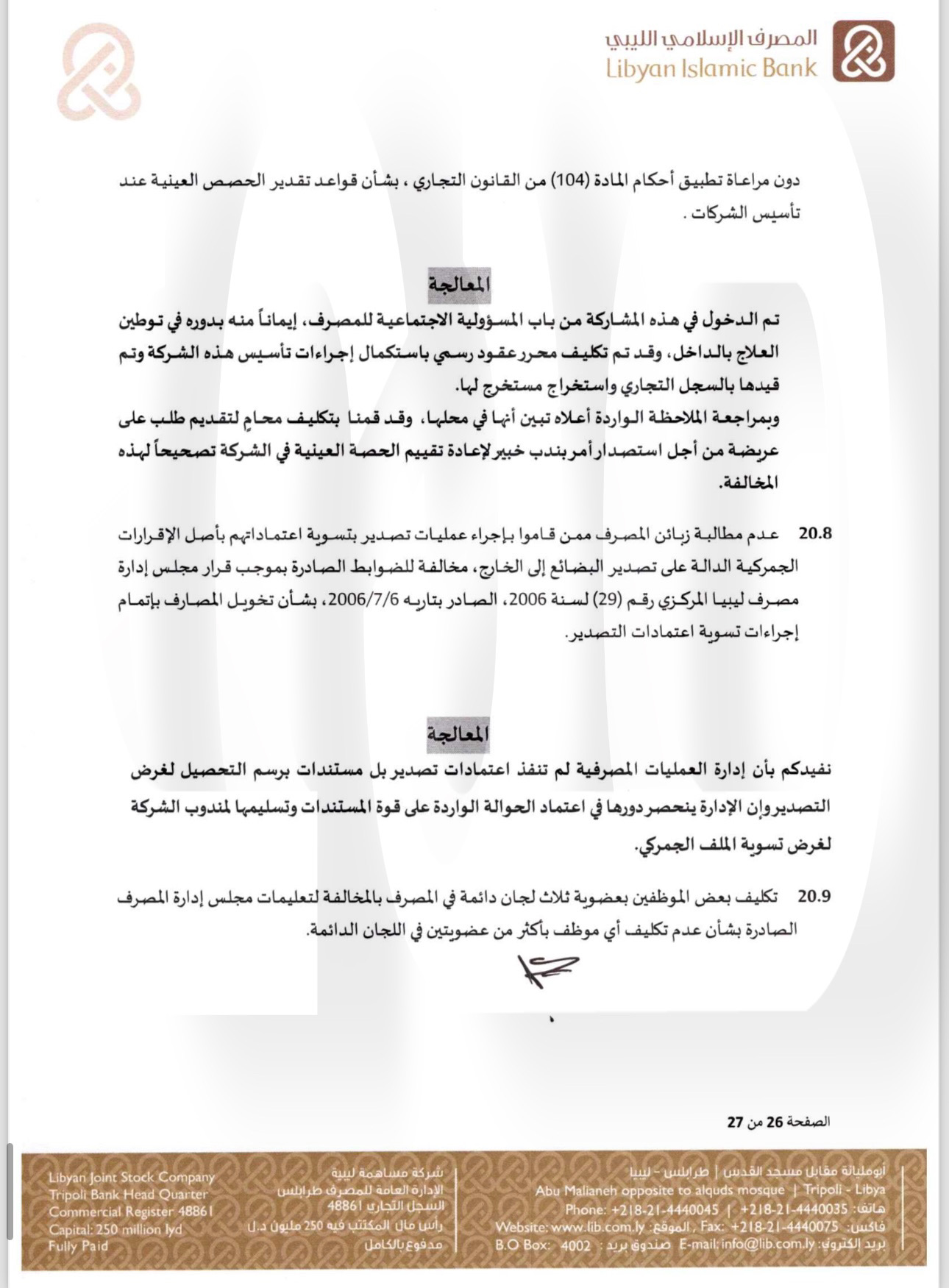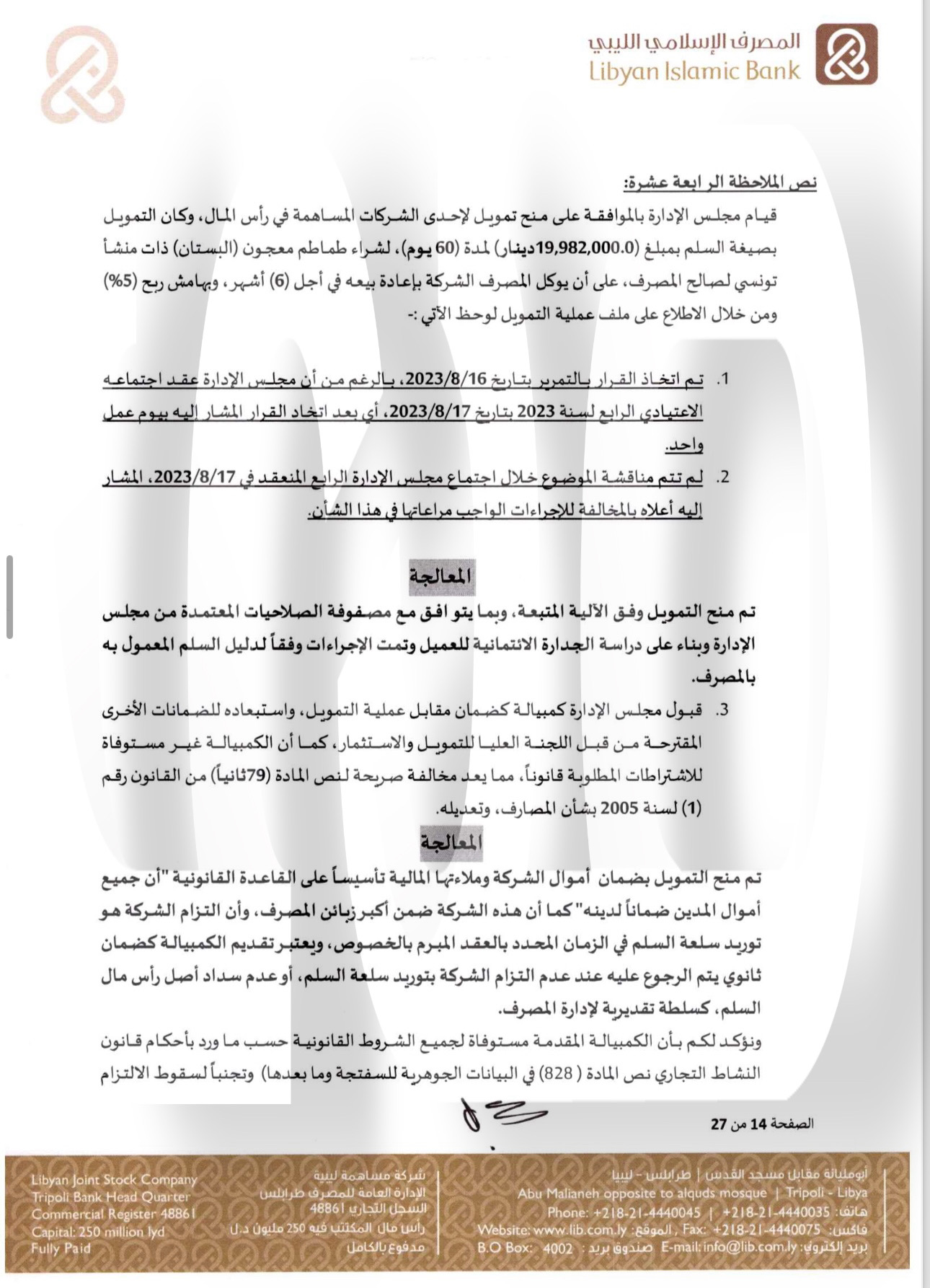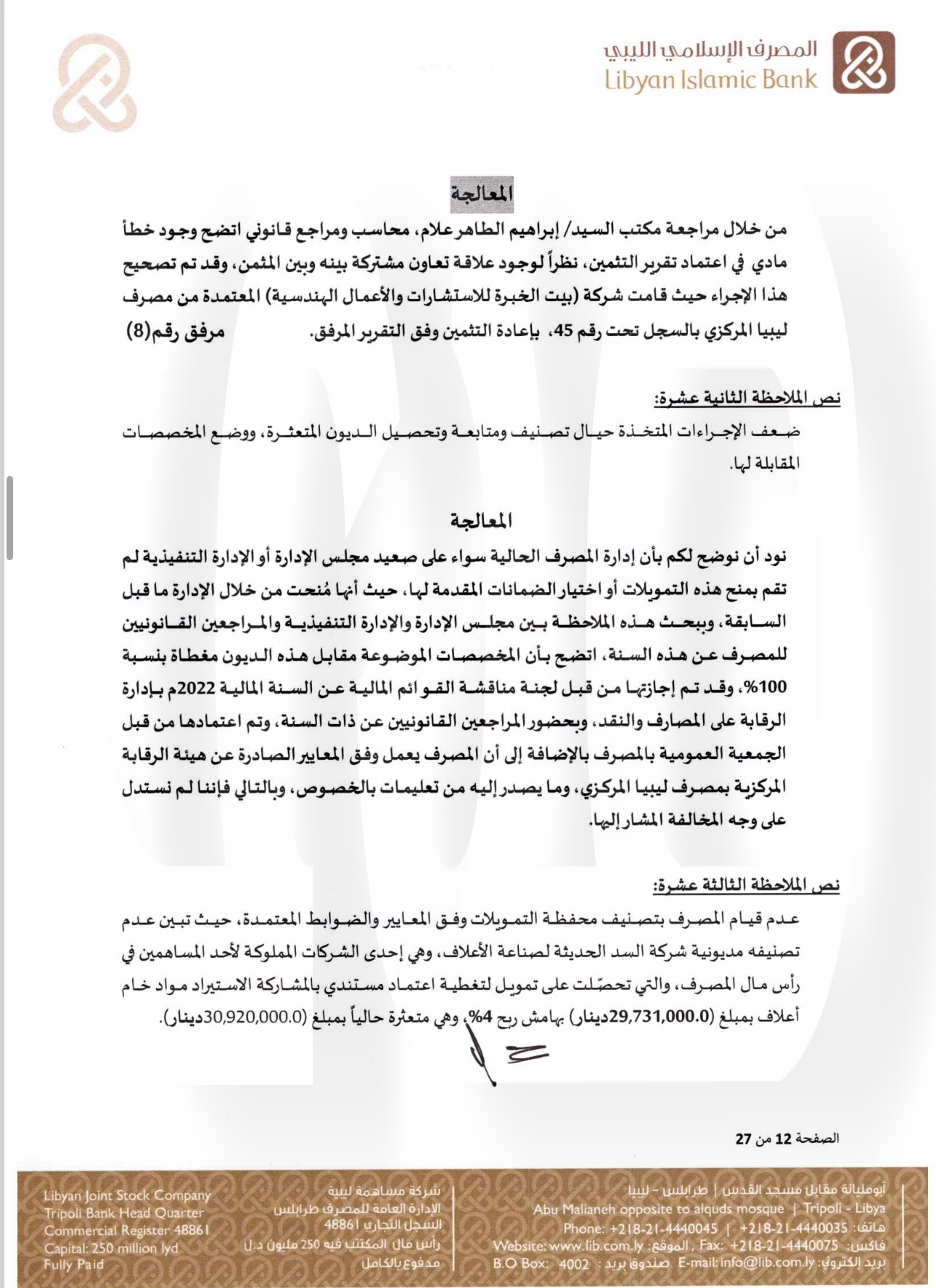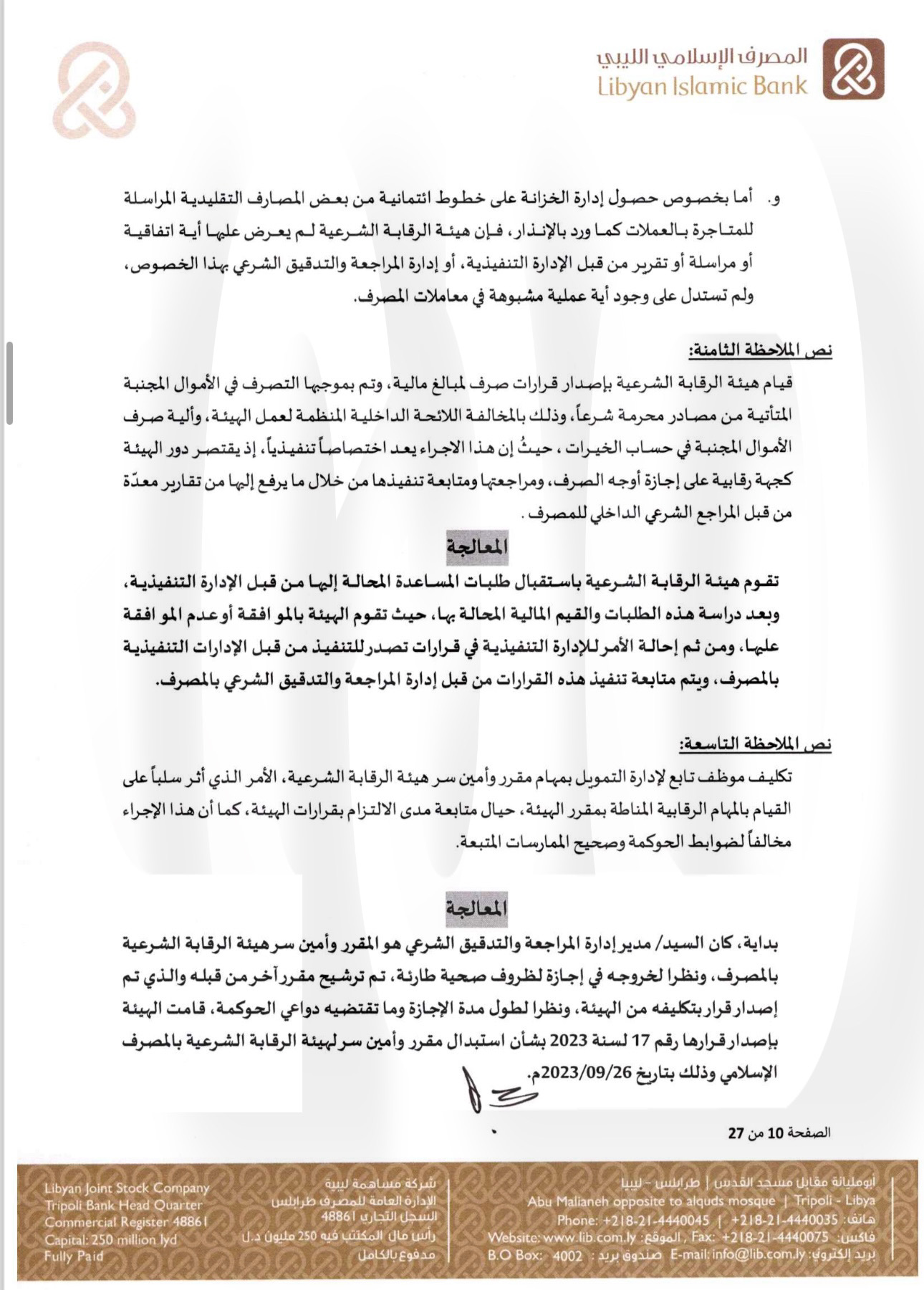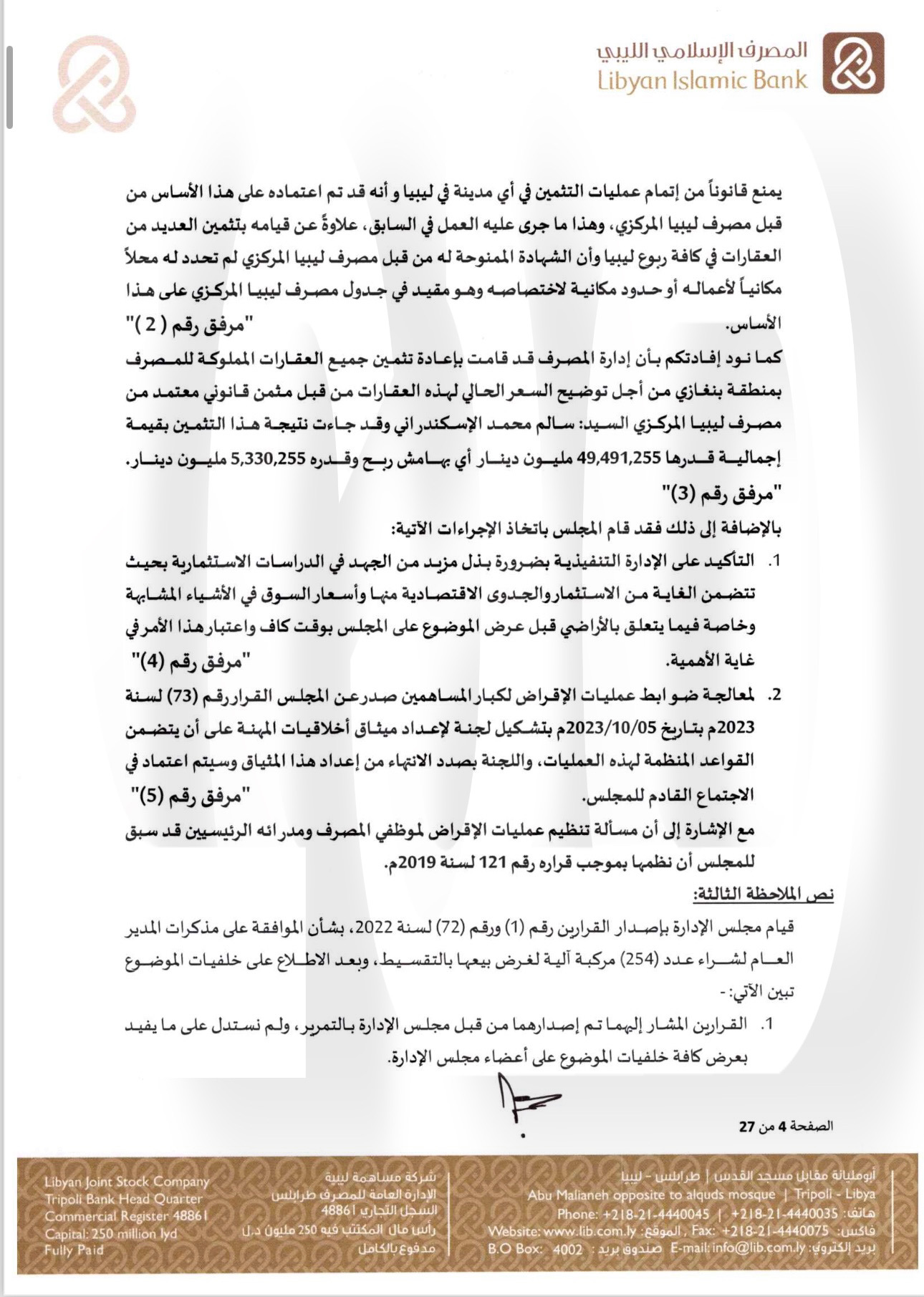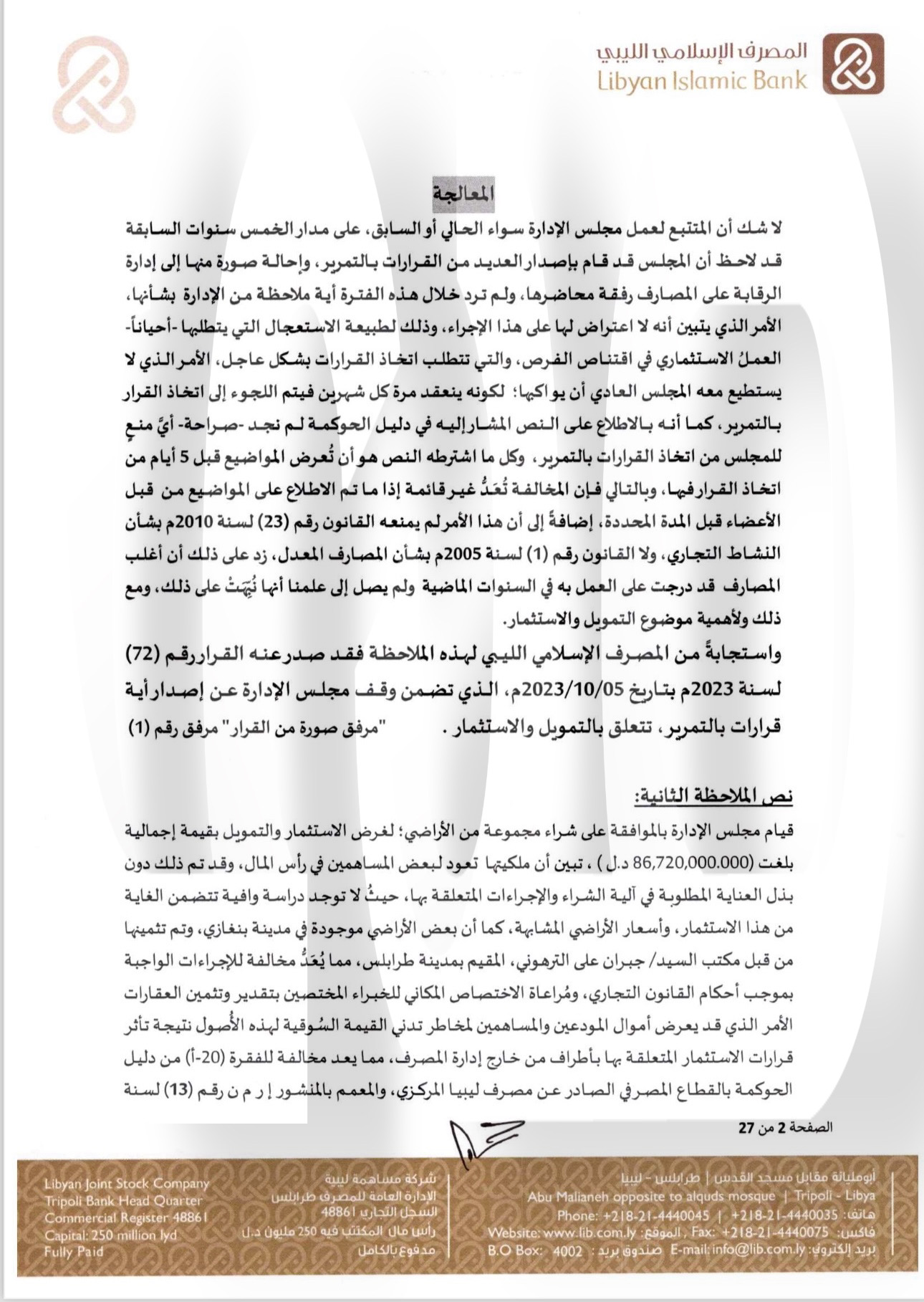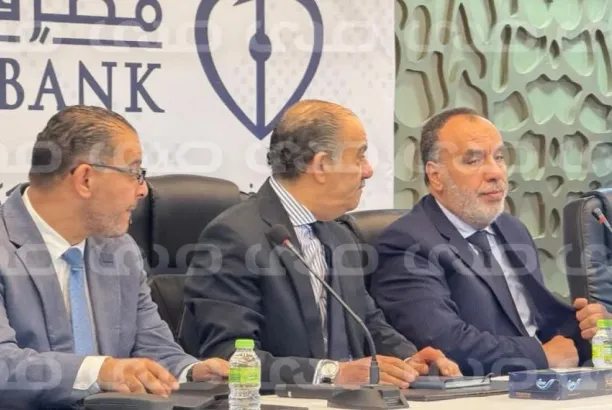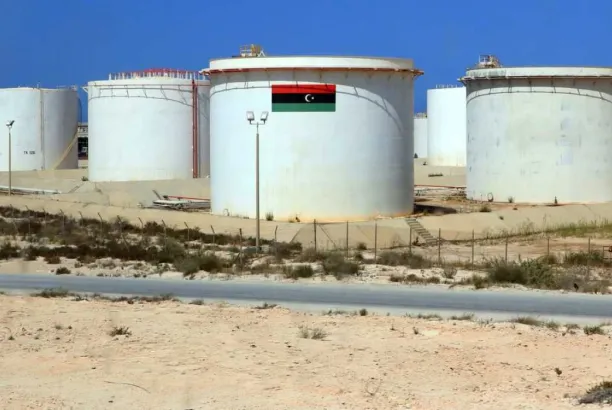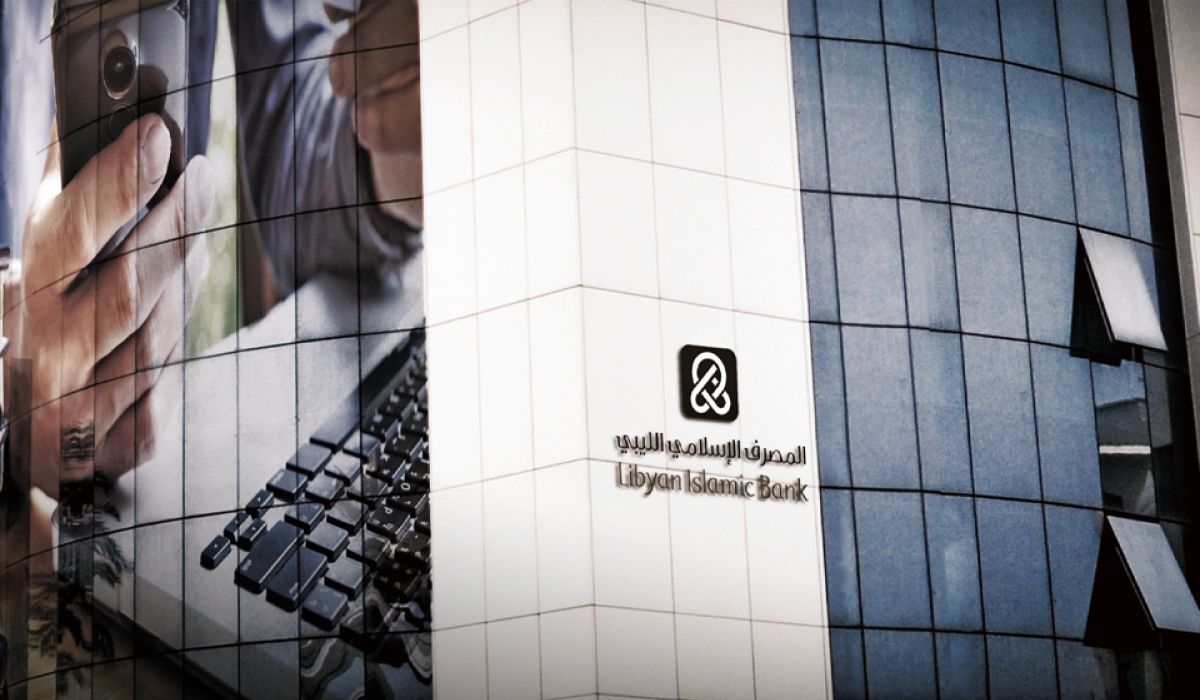
| News
Libyan Islamic Bank responds to the Central Bank regarding its financing grants and clarifies the details
Oour source exclusively obtained the response of the Libyan Islamic Bank dated October 26 to the previous observations made by the Central Bank regarding the grants of financing to major shareholders, which led to warning the bank and suspending the grants of financing to it. The latest of which was the suspension of several officials starting from the chairman of the board of directors, especially with none of the mentioned individuals assuming any other leadership positions.
In detail, as mentioned, “Islamic” clarified in the text of the first observation that the chairman of its board of directors, based on the memoranda presented by the bank’s general manager, issued a series of decisions related to financing and investment operations, to purchase a group of lands and real estate as investment assets approved for passage. There is no evidence indicating the presentation of memoranda and documents related to these decisions to all board members in sufficient time, without discussion and approval in the official meetings of the board of directors, which constitutes a violation of paragraph (21) – sixth / board meetings point (3) of the Governance Guide for the Banking Sector issued by the Central Bank of Libya, circulated under Circular No. (13) for the year 2010, which stipulated that all reports and documents related to the agenda items should be submitted in a timely manner, at least five days before the session, to enable members to thoroughly study the topics raised and make appropriate decisions regarding them.
Addressing what was mentioned in the text of the first observation, “Islamic” said: Undoubtedly, those who have followed the work of the board of directors, whether current or former, over the past five years have noticed that the board has issued many decisions for approval and referred a copy of them to the Banking Supervision Department along with its minutes. During this period, there were no remarks from the management regarding them, indicating that there was no objection to this action, due to the urgency sometimes required, and the investment work in seizing opportunities, which requires urgent decision-making. The regular board cannot accommodate due to its monthly meeting schedule, so decisions are made for approval. Moreover, upon reviewing the text referred to in the governance guide, we did not find any explicit prohibition for the board to make decisions for approval, and all that the text required was for the topics to be presented five days before making the decision on them. Thus, the violation is not applicable if the topics are reviewed by the members before the specified period. Additionally, this matter was not prohibited by Law No. (23) for the year 2010 regarding commercial activity or Law No. (1) for the year 2005 regarding amended banks. Furthermore, most banks have been accustomed to operating in this manner in recent years, and we have not been informed that they have deviated from it. However, due to the importance of the financing and investment subject, and in response to the observation, the Libyan Islamic Bank issued Decision No. (72) for the year 2023 dated 2023/10/05, which included the suspension of the board of directors from issuing any decisions for approval related to financing and investment.
As stated in the second observation, the board of directors approved the purchase of a group of lands for the purpose of investment and financing, with a total value of (86,720,000.000 LYD). It turned out that these lands are owned by some shareholders in the capital, and this was done without exercising the necessary diligence in the purchasing mechanism and related procedures. There is no comprehensive study including the purpose of this investment and the prices of similar lands. Some of the lands are located in Benghazi city and were appraised by the office of “Gabran Ali Al-Tarhouni”, located in Tripoli, which constitutes a violation of the required procedures under the provisions of commercial law, and considering the spatial jurisdiction of experts specialized in estimating and appraising real estate. This may expose the deposits and shareholders’ funds to risks of devaluation of the market value of these assets due to the influence of investment decisions related to them by parties outside the bank’s management, which constitutes a violation of paragraph (120) of the Governance Guide for the Banking Sector issued by the Central Bank of Libya, circulated under Circular No. (13) for the year 2023, which stipulated the necessity for the board of directors to establish controls for lending operations to bank employees, its main managers, board members, and major shareholders, ensuring that operations are conducted in accordance with market requirements without any preferential or discriminatory treatment for these parties, and that they are fully disclosed.
Regarding the handling of the second observation, it confirms that the purchase of this group of lands was for the purpose of secure real estate investment, considering its high returns whether through sale or lease, in accordance with the banking standard No. (10) for the year 2016 regarding leasing and lease-to-own issued by the Central Bank of Libya and the leasing guide applied by the bank. On this basis, presentation memoranda were prepared for the purpose of purchasing these lands, regardless of the identity of the owners of these properties. When completing the purchase procedures of these lands, the required professional care was taken to verify their ownership and appraise them by an accredited legal appraiser recognized by the Central Bank of Libya, based on a renewal certificate issued by the Banking Supervision Department. Upon approval by the board of directors in accordance with the authority matrix applied by the bank, these lands were purchased. Additionally, the bank did not exceed the authorized limit according to the rules of calculating the excess over the employment limits in fixed assets and contributions, in accordance with Circular No. (10) issued by the Central Bank of Libya for the year 2010 in the traditional system, as there are no regulations governing such matters in Islamic banks according to the repeated text of Article (5), paragraph (2) of Law No. (46) for the year 2012 amending Law No. 1 for the year 2005 regarding banks and adding a chapter for Islamic banking. Through following these procedures, we confirm that all purchases were made in accordance with market requirements for the purpose of secure real estate investment without any preferential or discriminatory treatment for these parties. In addition, approval decisions issued by the board of directors were referred within the minutes of the bank’s board meetings to comply with the relevant directives, ensuring full disclosure and transparency. As for considering the spatial jurisdiction of experts specialized in estimating and appraising real estate, the responsibility for not considering the spatial jurisdiction falls on the engineering appraiser who appraised the properties in Benghazi city, in accordance with Article (83), paragraph (3) of Law No. 1 for the year 2005, amended by Law No. 46 for the year 2012 regarding banks. To clarify this matter, the legal appraiser “Gabran Ali Al-Tarhouni” was summoned for discussion on how he conducted the appraisal, stating that there is no legal obstacle to conducting appraisal operations in any city in Libya, and that he has been approved on this basis by the Central Bank of Libya. This is what he has been doing in the past, in addition to appraising many properties across Libya, and the certificate awarded to him by the Central Bank of Libya did not specify a spatial location for his work or geographical boundaries for his jurisdiction. He is listed in the table of the Central Bank of Libya. The bank stated that it has revaluated all properties owned by the parent bank in Benghazi area in order to clarify the current price of these properties by an accredited legal appraiser recognized by the Central Bank of Libya “Salem Mohammed Al-Iskandarani”, and the result of this appraisal came to a total value of 49,491,255 million dinars, with a profit margin of 5,330,255 million dinars. Additionally, the board took some measures, including emphasizing to the executive management the need to exert more effort in investment studies, ensuring that they include the purpose of the investment and its economic feasibility, as well as market prices for similar things, especially regarding lands, before presenting the matter to the board with sufficient time, considering this matter of utmost importance. The board issued Decision No. (73) for the year 2 to address the controls of lending operations to major shareholders issued in 2023 dated 2023/10/05, forming a committee to prepare a code of ethics for the profession, including the rules regulating these operations. The committee is in the process of finalizing this document, which will be adopted in the upcoming board meeting. It is worth noting that the matter of regulating lending operations to bank employees and its main managers has previously been regulated by the board under its Decision No. 121 for the year 2019.
As for the third observation, it was mentioned that the board of directors issued Decisions No. (1) and No. (72) for the year 2022, regarding the approval of the general manager’s memoranda to purchase (254) motor vehicles for the purpose of selling them on installments. Upon reviewing the background of the matter, it was found that these decisions were issued by the board of directors in a rushed manner without presenting all the backgrounds of the matter to the board members. Considering that the individual segment in the bank is continuously increasing, which will affect the speed of marketing this product and thus increase the sales percentage, achieving the bank’s strategic objectives.
Regarding the fourth observation, it mentioned that the board of directors did not establish and approve the necessary policies, work guides, and procedures to regulate the treasury management work. In response to this, policies, work guides, and necessary procedures were prepared to organize the treasury management work, and they were approved by the Sharia Supervisory Board of the bank. Accordingly, the board of directors issued Decision No. 78 for the year 2023 approving the treasury management work policy on October 25, 2023. Additionally, the currency trading product was prepared and approved by the Sharia Supervisory Board of the bank, leading to the issuance of Decision No. 79 for the year 2023 approving the product.
As for the fifth observation, it noted that the board of directors did not enhance the regulatory environment in the bank, as there were no clear and written mechanisms for how the treasury management operates, with the board neglecting the role of internal control departments in monitoring the activities of this management. Despite the observations referred to it by the control departments regarding the lack of subjecting the treasury management to control and audit procedures, the response included the issuance of a new treasury management policy under the board’s Decision No. 78 for the year 2023, activating the role of internal control departments. A Guarantee Department was established to oversee all treasury management activities and to activate the risk management role by setting operation ceilings to minimize losses, and working according to market data and the best indicators for currency trading in accordance with Islamic law provisions.
Regarding the sixth observation, it was noted through a review of reports extracted from the Reuters system by the treasury management that the bank incurred losses in foreign exchange (FX) trading operations amounting to (13,000,000.0 LYD) in one session, which poses high operational and market risks negatively impacting the bank’s capital adequacy. In response, the board and the executive management corrected these observations by forming a committee to investigate with the treasury management director under the acting general manager’s Decision No. (116) for the year 2023 issued on September 26, 2023, and suspending currency trading operations in the treasury management under the acting general manager’s Decision No. (119) for the year 2023, based on a letter from the Banking and Monetary Control Department director. The treasury management director was relieved of duty by the board’s Decision No. (70) for the year 2023 dated October 9, 2023, and a new experienced and highly qualified treasury management director was appointed under the board’s Decision No. (71) for the year 2023.
In the seventh observation, it was also stated that the role of the Sharia Supervisory Board in monitoring the treasury management operations in the bank and reviewing its contracts and agreements with correspondent banks (Islamic and conventional), as well as the products applied to employ its funds, was weak. The board issued its report for the year 2022, affirming the integrity of all operations and transactions conducted by the bank. However, the treasury management obtained credit lines from some conventional correspondent banks for currency trading without entering into any agreements with the correspondents in this regard, then having it approved by the bank’s management and ratified by the Sharia Supervisory Board. Nevertheless, the board, through the Sharia Supervisory Board, ensured the implementation of banking, financing, and investment operations to achieve Sharia compliance and in accordance with the tasks entrusted to the Sharia Supervisory Board. Given the significance of the treasury management department in the bank, the Sharia Supervisory Board took several steps to ensure the legitimacy of the operations carried out by this department. For instance, they summoned the head of the supervisory authority, the head of the accounting and treasury department, and his deputy to their fifth meeting of 2021 held on October 3, 2021, to inquire about the policy and work guide of the department. At that time, it was revealed that there was no specific policy or work guide for the executive activities of this department. They also questioned the head of the department about some details to ensure the legitimacy of the transactions, such as inquiring about the department’s acquisition of financing options through margin trading or financial leverage and the risks associated with exchange operations, as well as the sources of funds used. The response from the head of the department affirmed the department’s reliance on the bank’s own resources in currency trading, compliance with exchange and convergence controls in currency trading, and the Sharia Supervisory Board’s insistence on the presence of a clear policy and work guide. The board emphasized the necessity for the department to adhere to Sharia controls in exchange and convergence in currency trading, refraining from using illegitimate methods in financial market dealings such as arbitrage and delaying convergence.
In the eighth observation, it was noted that the Sharia Supervisory Board issued financial disbursement decisions, through which disbursement was made from unlawfully acquired funds, contrary to the internal regulations governing the work of the board and the mechanism for disbursement of unearned funds in the charity account. This action exceeded its executive jurisdiction since the board’s role as a supervisory body is limited to approving expenditure items and reviewing and monitoring their implementation through reports submitted by the bank’s internal Sharia auditor. In response, the Sharia Supervisory Board receives assistance requests from the executive management. After studying these requests and the financial values involved, the board approves or rejects them, then refers the matter to the executive management for implementation through decisions issued by the bank’s executive departments. The implementation of these decisions is then monitored by the Sharia auditing and review department of the bank.
In the ninth observation, it was mentioned that an employee of the finance department was appointed as the secretary and rapporteur of the Sharia Supervisory Board, negatively affecting the performance of the supervisory duties assigned to the board’s rapporteur in monitoring compliance with the board’s decisions. This action contravenes governance regulations and sound practices. To address this, initially, the head of the Sharia auditing and review department served as the rapporteur and secretary of the Sharia Supervisory Board in the bank. Due to his absence on sick leave, another rapporteur nominated by him was appointed, and a decision was issued by the board to appoint him. Given the duration of the leave and governance considerations, the board issued its decision No. 17 for the year 2023 on September 26, 2023, regarding the replacement of the rapporteur and secretary of the Sharia Supervisory Board in the Libyan Islamic Bank.
In the tenth observation, it was found that some real estate investments, represented by pieces of land owned by the bank in exchange for settling overdue installments from troubled financing operations in the lease-to-own format, confirmed the bank’s failure to exercise due diligence in preparing the necessary studies when granting financing in the lease-to-own format. These financings were granted on the basis of lease-to-own during the first quarter of 2021 by the previous management, which had been subject to previous observations. Under the instructions of the Central Bank of Libya, it was necessary to follow up on these debts. In order to rectify the situations of these financings, the executive management took several legal actions against these debtors to settle their obligations. Consequently, some installments were paid, and to safeguard the bank’s rights and ensure the collection of these installments, the bank purchased these properties in exchange for the outstanding installments. However, the bank retained ownership of these properties subject to lease-to-own agreements. Additionally, some installments on these properties were paid. With these measures, the bank preserved its rights. Moreover, the Libyan Islamic Bank has previous experiences in debt collection, having obtained executive orders for promissory notes provided as guarantees for debts, and has seized client proceeds with the Medical Supply Agency, resulting in the collection of an amount of 4,700,000.000 Libyan Dinars, in addition to lawsuits filed against some clients to collect these debts. Furthermore, this matter was previously presented to the Banking Control and Audit Administration, and they were provided with all the documents related to these properties.
In the eleventh observation, it was revealed that some land valuation operations for land parcels acquired by the bank were carried out by the office of “Ibrahim Al-Tahir Al-Am” without adhering to the provisions of Article 82 of the Banking Law, which assigns the task of valuing and evaluating real estate assets to offices and houses of expert engineering. Upon review by “Ibrahim Al-Tahir Al-Am”, an accountant and legal auditor, it was found that there was a material error in approving the valuation report due to a cooperative relationship between him and the appraiser. This procedure was corrected by engaging the House of Expertise for Consultancy and Engineering Works, accredited by the Central Bank of Libya under No. 45, to reassess according to the attached report.
The twelfth observation mentioned the weakness in procedures regarding the classification, monitoring, and collection of overdue debts and the establishment of corresponding provisions. It should be clarified that the current bank management, whether at the board or executive level, did not grant these financings or select the guarantees provided for them. They were granted by the previous management. This observation has been discussed between the board, the executive management, and the bank’s legal auditors for this year. It has been revealed that the provisions set aside for these debts are covered by 100%, and they were approved by the Financial Statements Discussion Committee for the fiscal year 2022 at the Banking Control and Audit Administration, in the presence of legal auditors for the same year. They were also approved by the bank’s general assembly. Moreover, the bank operates according to the standards issued by the Central Control Authority of the Central Bank of Libya and the instructions issued to it in this regard. Therefore, no violation has been identified.
Through the thirteenth observation, it became apparent that the bank did not classify its financing portfolio according to the approved standards and controls. It was found that it did not classify the indebtedness of Modern Dam Company for Animal Feed Industry, one of the companies owned by a shareholder in the bank’s capital, which obtained financing to cover a documentary credit for the participation in importing raw materials for animal feed in the amount of (29,731,000.00 Libyan Dinars) with a profit margin of 4%. Currently, this company is in arrears with an amount of (30,920,000.0 Libyan Dinars). To address this issue, based on Standard No. 15 for participation and Standard No. 11 for documentary credits issued by the Central Control Authority of the Central Bank of Libya and the operational guide for participation products used by the bank, and in accordance with the directives of the Central Bank of Libya regarding participation in importing raw materials, the participation operation was conducted. It is based on a jurisprudential basis (profit and loss sharing) and guarantees the client’s transactions. According to Standard No. 17 for negligence and default, and due to commercial recession after the arrival of these goods, the increase in supply in the market, and comparing the supply price with the trading prices of these goods in the local market, the client’s delay in marketing the supplied goods resulted in the bank not purchasing its share. Consequently, the participation agreement continued, including the legal nature of the shared commodity, considering it owned in common between the parties. Upon reviewing all the standards regulating the operation of Islamic banking in the participation format, whether issued by the Central Control Authority or international standards issued by the AAOIFI for Islamic financial institutions, no indication was found to form any provisions. Instead, it necessitated the separation of the sales contract from the participation contract, and the basis of the sale is optional according to the will of the parties, so that the participation contract is separate from the sales contract. As a precaution against any price decline before selling the shared goods, a general provision was formed to confront such risks, amounting to 5,000,000.000 Libyan Dinars, which is more than the requirements of professional care to face risks in such cases. To address the issue, the bank’s management communicated with the client to negotiate the method of selling the bank’s share, to avoid any risks that may occur during the sale of the shared goods. The client submitted a request to purchase the bank’s share in two installments, and the matter was presented to the board of directors, which approved the sale of the share in two installments, the first of which is currently and the second during the first half of the next year. Accordingly, the client paid an amount of 15,460,111.003 Libyan Dinars as a first installment and provided a mortgage as collateral to guarantee the payment of the second installment, attached with a deposit receipt and portfolio addition notice.
The fourteenth observation included the approval by the board of directors to grant financing to one of the contributing companies in the capital. The financing was in the form of Salam with an amount of (19,982,000.0 Libyan Dinars) for a period of (60) days to purchase tomato paste (Al-Bustan) of Tunisian origin on behalf of the bank, with the bank entrusting the company with reselling it within a period of (6) months, with a profit margin of (5%). Upon reviewing the financing operation file, it was noted that the decision was made on August 16, 2023, despite the fact that the board of directors held its fourth regular meeting for the year 2023 on August 17, 2023, one working day after the decision was made. The subject was not discussed during the fourth board of directors meeting held on 2023/8/17, contrary to the procedures to be followed in this regard. The financing was granted in accordance with the established mechanism and in line with the matrix of authorities approved by the board of directors, based on the creditworthiness study of the client. The procedures were carried out in accordance with the Salam operational guide used by the bank. The board of directors accepted the bill as collateral against the financing operation and excluded other guarantees proposed by the Higher Committee for Financing and Investment. However, the bill did not meet the required legal requirements, which constitutes an explicit violation of Article (79 secondly) of Law No. (1) of 2005 concerning banks and its amendments. The financing was granted based on the company’s funds and financial solvency, based on the legal principle “all the debtor’s funds are collateral for his debt.” Moreover, this company is one of the bank’s largest clients, and the company’s commitment is to supply the Salam commodity within the specified time frame in the contract. The provision of the bill as secondary collateral is referred to in case of the company’s failure to supply the Salam commodity or to repay the principal amount of the Salam, as per the discretionary authority of the bank’s management. The bill provided is compliant with all legal requirements according to the provisions of the Commercial Activities Law, Article (828), in the substantive provisions of the bill and thereafter to avoid the obligation, the bank obtains authorization from the client to deduct the stamp duty when commencing the protest procedures stipulated in the Commercial Activities Law. The bill is referred to as secondary collateral, and the bank has a previous experience of resorting to the bill and enforcing it against customers. The financing was granted in the form of Salam in violation of the regulations governing the Salam operation, as indicated in the Salam product operational guide approved by the board of directors and the Sharia Supervisory Board of the bank. Upon reviewing the Salam granting process, no violation was found in granting the financing according to the Islamic banking standard Salam and the parallel Salam issued by the Central Control Authority of the Central Bank of Libya and the Salam product guide approved by the board of directors and the Sharia Supervisory Board of the bank. The procedures were carried out according to the steps mentioned in the guide. There is no indication in the financial feasibility study model or in the Salam contract to suggest that this process is subject to prior Sharia auditing procedures, in accordance with the auditing procedures required by the approved standards, given the relative importance of this operation to the bank’s financing portfolio. This flaw was the result of inaccurate recommendations from the Sharia Supervisory Board after subjecting the financings to prior Sharia review by the internal Sharia auditing management. Financing was granted according to the creditworthiness study of the client and the study was presented to the regulatory departments of the bank. Regarding the flaw resulting from inaccurate recommendations from the Sharia Supervisory Board after subjecting the financings to prior Sharia review by the internal Sharia auditing management, the Sharia Supervisory Board directed the executive management by its letter No. 22/26 dated March 29, 2022, that one of the tasks of the auditing and Sharia auditing management is to follow up on the necessary data in the contracts. The Sharia audit is limited to the contracts without the financial study. This was evident in the response to the tenth observation. Financing was granted based on the creditworthiness study of the client, and the study was presented to the regulatory departments of the bank. As for the flaw resulting from inaccurate recommendations from the Sharia Supervisory Board after subjecting the financings to prior Sharia review by the internal Sharia auditing management, the Sharia Supervisory Board directed the executive management by its letter No. 22/26 dated March 29, 2022, that one of the tasks of the auditing and Sharia auditing management is to follow up on the necessary data in the contracts. The Sharia audit is limited to the contracts without the financial study. This was evident in the response to the tenth observation. Financing was granted based on the creditworthiness study of the client, and the study was presented to the regulatory departments of the bank. As for the flaw resulting from inaccurate recommendations from the Sharia Supervisory Board after subjecting the financings to prior Sharia review by the internal Sharia auditing management, the Sharia Supervisory Board directed the executive management by its letter No. 22/26 dated March 29, 2022, that one of the tasks of the auditing and Sharia auditing management is to follow up on the necessary data in the contracts. The Sharia audit is limited to the contracts without the financial study. This was evident in the response to the tenth observation. Financing was granted based on the creditworthiness study of the client, and the study was presented to the regulatory departments of the bank. As for the flaw resulting from inaccurate recommendations from the Sharia Supervisory Board after subjecting the financings to prior Sharia review by the internal Sharia auditing management, the Sharia Supervisory Board directed the executive management by its letter No. 22/26 dated March 29, 2022, that one of the tasks of the auditing and Sharia auditing management is to follow up on the necessary data in the contracts. The Sharia audit is limited to the contracts without the financial study. This was evident in the response to the tenth observation. Financing was granted based on the creditworthiness study of the client, and the study was presented to the regulatory departments of the bank. As for the flaw resulting from inaccurate recommendations from the Sharia Supervisory Board after subjecting the financings to prior Sharia review by the internal Sharia auditing management, the Sharia Supervisory Board directed the executive management by its letter No. 22/26 dated March 29, 2022, that one of the tasks of the auditing and Sharia auditing management is to follow up on the necessary data in the contracts. The Sharia audit is limited to the contracts without the financial study. This was evident in the response to the tenth observation. Financing was granted based on the creditworthiness study of the client, and the study was presented to the regulatory departments of the bank. As for the flaw resulting from inaccurate recommendations from the Sharia Supervisory Board after subjecting the financings to prior Sharia review by the internal Sharia auditing management, the Sharia Supervisory Board directed the executive management by its letter No. 22/26 dated March 29, 2022, that one of the tasks of the auditing and Sharia auditing management is to follow up on the necessary data in the contracts. The Sharia audit is limited to the contracts without the financial study. This was evident in the response to the tenth observation. Financing was granted based
on the creditworthiness study of the client, and the study was presented to the regulatory departments of the bank. As for the flaw resulting from inaccurate recommendations from the Sharia Supervisory Board after subjecting the financings to prior Sharia review by the internal Sharia auditing management, the Sharia Supervisory Board directed the executive management by its letter No. 22/26 dated March 29, 2022, that one of the tasks of the auditing and Sharia auditing management is to follow up on the necessary data in the contracts. The Sharia audit is limited to the contracts without the financial study. This was evident in the response to the tenth observation. Financing was granted based on the creditworthiness study of the client, and the study was presented to the regulatory departments of the bank. Regarding the flaw resulting from inaccurate recommendations from the Sharia Supervisory Board after subjecting the financings to prior Sharia review by the internal Sharia auditing management, the Sharia Supervisory Board directed the executive management by its letter No. 22/26 dated March 29, 2022, that one of the tasks of the auditing and Sharia auditing management is to follow up on the necessary data in the contracts. The Sharia audit is limited to the contracts without the financial study. This was evident in the response to the tenth observation. Financing was granted based on the creditworthiness study of the client, and the study was presented to the regulatory departments of the bank. Regarding the flaw resulting from inaccurate recommendations from the Sharia Supervisory Board after subjecting the financings to prior Sharia review by the internal Sharia auditing management, the Sharia Supervisory Board directed the executive management by its letter No. 22/26 dated March 29, 2022, that one of the tasks of the auditing and Sharia auditing management is to follow up on the necessary data in the contracts. The Sharia audit is limited to the contracts without the financial study. This was evident in the response to the tenth observation. Financing was granted based on the creditworthiness study of the client, and the study was presented to the regulatory departments of the bank. As for the flaw resulting from inaccurate recommendations from the Sharia Supervisory Board after subjecting the financings to prior Sharia review by the internal Sharia auditing management, the Sharia Supervisory Board directed the executive management by its letter No. 22/26 dated March 29, 2022, that one of the tasks of the auditing and Sharia auditing management is to follow up on the necessary data in the contracts. The Sharia audit is limited to the contracts without the financial study. This was evident in the response to the tenth observation. Financing was granted based on the creditworthiness study of the client, and the study was presented to the regulatory departments of the bank. As for the flaw resulting from inaccurate recommendations from the Sharia Supervisory Board after subjecting the financings to prior Sharia review by the internal Sharia auditing management, the Sharia Supervisory Board directed the executive management by its letter No. 22/26 dated March 29, 2022, that one of the tasks of the auditing and Sharia auditing management is to follow up on the necessary data in the contracts. The Sharia audit is limited to the contracts without the financial study. This was evident in the response to the tenth observation. Financing was granted based on the creditworthiness study of the client, and the study was presented to the regulatory departments of the bank. As for the flaw resulting from inaccurate recommendations from the Sharia Supervisory Board after subjecting the financings to prior Sharia review by the internal Sharia auditing management, the Sharia Supervisory Board directed the executive management by its letter No. 22/26 dated March 29, 2022, that one of the tasks of the auditing and Sharia auditing management is to follow up on the necessary data in the contracts. The Sharia audit is limited to the contracts without the financial study. This was evident in the response to the tenth observation. Financing was granted based on the creditworthiness study of the client, and the study was presented to the regulatory departments of the bank. As for the flaw resulting from inaccurate recommendations from the Sharia Supervisory Board after subjecting the financings to prior Sharia review by the internal Sharia auditing management, the Sharia Supervisory Board directed the executive management by its letter No. 22/26 dated March 29, 2022, that one of the tasks of the auditing and Sharia auditing management is to follow up on the necessary data in the contracts. The Sharia audit is limited to the contracts without the financial study. This was evident in the response to the tenth observation. Financing was granted based on the creditworthiness study of the client, and the study was presented to the regulatory departments of the bank. As for the flaw resulting from inaccurate recommendations from the Sharia Supervisory Board after subjecting the financings to prior Sharia review by the internal Sharia auditing management, the Sharia Supervisory Board directed the executive management by its letter No. 22/26 dated March 29, 2022, that one of the tasks of the auditing and Sharia auditing management is to follow up on the necessary data in the contracts. The Sharia audit is limited to the contracts without the financial study. This was evident in the response to the tenth observation. Financing was granted based on the creditworthiness study of the client, and the study was presented to the regulatory departments of the bank. As for the flaw resulting from inaccurate recommendations from the Sharia Supervisory Board after subjecting the financings to prior Sharia review by the internal Sharia auditing management, the Sharia Supervisory Board directed the executive management by its letter No. 22/26 dated March 29, 2022, that one of the tasks of the auditing and Sharia auditing management is to follow up on the necessary data in the contracts. The Sharia audit is limited to the contracts without the financial study. This was evident in the response to the tenth observation. Financing was granted based on the creditworthiness study of the client, and the study was presented to the regulatory departments of the bank. As for the flaw resulting from inaccurate recommendations from the Sharia Supervisory Board after subjecting the financings to prior Sharia review by the internal Sharia auditing management, the Sharia Supervisory Board directed the executive management by its letter No. 22/26 dated March 29, 2022, that one of the tasks of the auditing and Sharia auditing management is to follow up on the necessary data in the contracts. The Sharia audit is limited to the contracts without the financial study. This was evident in the response to the tenth observation. Financing was granted based on the creditworthiness study of the client, and the study was presented to the regulatory departments of the bank. As for the flaw resulting from inaccurate recommendations from the Sharia Supervisory Board after subjecting the financings to prior Sharia review by the internal Sharia auditing management, the Sharia Supervisory Board directed the executive management by its letter No. 22/26 dated March 29, 2022, that one of the tasks of the auditing and Sharia auditing management is to follow up on the necessary data in the contracts. The Sharia audit is limited to the contracts without the financial study. This was evident in the response to the tenth observation. Financing was granted based on the creditworthiness study of the client, and the study was presented to the regulatory departments of the bank. Regarding the flaw resulting from inaccurate recommendations from the Sharia Supervisory Board after subjecting the financings to prior Sharia review by the internal Sharia auditing management, the Sharia Supervisory Board directed the executive management by its letter No. 22/26 dated March 29
, 2022, that one of the tasks of the auditing and Sharia auditing management is to follow up on the necessary data in the contracts. The Sharia audit is limited to the contracts without the financial study. This was evident in the response to the tenth observation. Financing was granted based on the creditworthiness study of the client, and the study was presented to the regulatory departments of the bank. As for the flaw resulting from inaccurate recommendations from the Sharia Supervisory Board after subjecting the financings to prior Sharia review by the internal Sharia auditing management, the Sharia Supervisory Board directed the executive management by its letter No. 22/26 dated March 29, 2022, that one of the tasks of the auditing and Sharia auditing management is to follow up on the necessary data in the contracts. The Sharia audit is limited to the contracts without the financial study. This was evident in the response to the tenth observation. Financing was granted based on the creditworthiness study of the client, and the study was presented to the regulatory departments of the bank. As for the flaw resulting from inaccurate recommendations from the Sharia Supervisory Board after subjecting the financings to prior Sharia review by the internal Sharia auditing management, the Sharia Supervisory Board directed the executive management by its letter No. 22/26 dated March 29, 2022, that one of the tasks of the auditing and Sharia auditing management is to follow up on the necessary data in the contracts. The Sharia audit is limited to the contracts without the financial study. This was evident in the response to the tenth observation. Financing was granted based on the creditworthiness study of the client, and the study was presented to the regulatory departments of the bank. As for the flaw resulting from inaccurate recommendations from the Sharia Supervisory Board after subjecting the financings to prior Sharia review by the internal Sharia auditing management, the Sharia Supervisory Board directed the executive management by its letter No. 22/26 dated March 29, 2022, that one of the tasks of the auditing and Sharia auditing management is to follow up on the necessary data in the contracts. The Sharia audit is limited to the contracts without the financial study. This was evident in the response to the tenth observation. Financing was granted based on the creditworthiness study of the client, and the study was presented to the regulatory departments of the bank. As for the flaw resulting from inaccurate recommendations from the Sharia Supervisory Board after subjecting the financings to prior Sharia review by the internal Sharia auditing management, the Sharia Supervisory Board directed the executive management by its letter No. 22/26 dated March 29, 2022, that one of the tasks of the auditing and Sharia auditing management is to follow up on the necessary data in the contracts. The Sharia audit is limited to the contracts without the financial study. This was evident in the response to the tenth observation. Financing was granted based on the creditworthiness study of the client, and the study was presented to the regulatory departments of the bank. As for the flaw resulting from inaccurate recommendations from the Sharia Supervisory Board after subjecting the financings to prior Sharia review by the internal Sharia auditing management, the Sharia Supervisory Board directed the executive management by its letter No. 22/26 dated March 29, 2022, that one of the tasks of the auditing and Sharia auditing management is to follow up on the necessary data in the contracts. The Sharia audit is limited to the contracts without the financial study. This was evident in the response to the tenth observation. Financing was granted based on the creditworthiness study of the client, and the study was presented to the regulatory departments of the bank. As for the flaw resulting from inaccurate recommendations from the Sharia Supervisory Board after subjecting the financings to prior Sharia review by the internal Sharia auditing management, the Sharia Supervisory Board directed the executive management by its letter No. 22/26 dated March 29, 2022, that one of the tasks of the auditing and Sharia auditing management is to follow up on the necessary data in the contracts. The Sharia audit is limited to the contracts without the financial study. This was evident in the response to the tenth observation. Financing was granted based on the creditworthiness study of the client, and the study was presented to the regulatory departments of the bank. As for the flaw resulting from inaccurate recommendations from the Sharia Supervisory Board after subjecting the financings to prior Sharia review by the internal Sharia auditing management, the Sharia Supervisory Board directed the executive management by its letter No. 22/26 dated March 29, 2022, that one of the tasks of the auditing and Sharia auditing management is to follow up on the necessary data in the contracts. The Sharia audit is limited to the contracts without the financial study. This was evident in the response to the tenth observation. Financing was granted based on the creditworthiness study of the client, and the study was presented to the regulatory departments of the bank.
The fifteenth observation also mentioned the non-utilization of banking system 124 as required in preparing the reports requested by the Central Bank of Libya. It was noted that manually prepared reports using Excel lacked the minimum information and data required for presentation and disclosure requirements. Furthermore, the banking system has not yet been utilized to provide reports in Arabic according to prevailing regulations. In addressing this, the Libyan Islamic Bank relies on the Temenos 124 banking system, which is among the best banking systems. The bank has a highly competent technical team, as attested by the bank’s technical partners. This team successfully upgraded the banking system from version R16 to the latest update, R22, without disrupting services to customers. Currently, the system can generate all reports and financial statements in English, which does not imply a weakness in system outputs or compromise the accuracy of the data included. To facilitate the translation of these reports and data, a secondary reporting system is used to extract reports in Arabic. Thus, it is easy to refer back to the English text of the reports in case the data is unclear in the secondary system. We also want to assure you that work is ongoing to complete the translation of the required reports in line with the Central Bank of Libya’s requirements and according to the comprehensive development plan for the banking system. A committee has been formed to oversee the translation of the system, led by the acting General Manager. Additionally, one of its members, Dr. Mustafa Al-Saqizli, has been tasked by the board to monitor this matter. Through communication with them, it has been confirmed that this system will commence producing reports in Arabic.
The sixteenth observation also highlighted the weakness in the procedures taken regarding the monitoring of delinquent debts, their classification, and the establishment of corresponding provisions in accordance with the approved accounting standards and regulatory instructions issued in this regard. This is a result of the absence of a clear internal policy specific to the bank. To address this, delinquent finances are monitored according to the legal procedures followed by the bank, as evidenced by the installments collected from the total financing portfolio of the bank. Debts are classified and provisions are established according to the banking standards approved by the Central Bank of Libya. Over the past financial years, no observations have been made in this regard, whether by the bank’s legal auditors, or during the discussion of the public budgets and financial statements of the bank by the Banking Supervision and Regulation Department. All public budgets of the bank from 2017 to 2022 were approved by the bank’s general assembly, with permission from the Central Bank of Libya through the Banking Supervision and Regulation Department. It is inconceivable to grant permission in the presence of these observations. Additionally, the Finance and Investment Department of the bank monthly refers a report listing all delinquent debts to the Credit Information Department of the Central Bank of Libya, including the current status of the financing portfolio. This department issued 22 warnings to nine companies to pay off their debts. Moreover, the legal office issued four notifications to four companies to comply with paying their overdue dues. Legal action was taken against Al-Fahd Importer of Medicines and Medical Equipment with a seizure document amounting to 4,693,614 Libyan Dinars. Additionally, a deduction of 5,000,000 Libyan Dinars was made from the company, Extension for Food Import, as part of its overdue installments. For the follow-up of all delinquent debts, a team has been formed.
In the seventeenth observation, the bank’s board of directors violated Circular No. (13) of 2010 and the instructions issued regarding corporate governance in the banking sector. It was noted that the bank did not establish a charter or guide for governance except for the committees’ charter derived from the board of directors, despite repeated warnings to the bank regarding this matter. The bank considered the committees’ charter and policies related to the compensation of board members and executive management as subsidiary regulatory documents to be included within the framework of the comprehensive institutional governance charter of the bank. Furthermore, the bank did not establish an internal regulation for organizing the work of the board of directors or a policy and procedural guide for treasury management. As a remedy, the board of directors, since assuming its duties, has taken numerous regulatory measures by updating the risk and compliance management policies and by establishing and reinforcing regulatory procedures through contracting for the ISO 90001 system to update the bank’s quality system. The governance committee was tasked with developing the bank’s governance guide and the board’s regulation. After the issuance of the Islamic Banks Governance Guide on 2023/08/20, under the circular of the Banking Supervision and Regulation Department No. (2023/25), the governance committee was assigned to make the necessary amendments to these documents in accordance with the new guide. It is worth noting that the work of the board of directors, prior to the issuance of this guide, is subject to prevailing legislations, including the Banking Law, Commercial Activity Law, and the Bank’s Articles of Association, as well as circulars and instructions issued by the Central Bank of Libya. Moreover, we have not found evidence of repeated warnings to the bank regarding this matter, considering that there are no regulations governing the work of Islamic banks, hence warning in the absence of legislative framework is not conceivable. This observation has been addressed with the issuance of some resolutions by the board of directors, including Resolution No. (76) of 2023 regarding the adoption of the governance guide in the bank, attached as Annex (11), and Resolution No. (77) regarding the adoption of the board of directors’ work regulation. As for the establishment of policies, work guides, and treasury management procedures, they have been approved as stated in the fourth observation.
In the eighteenth observation, the bank was found to be in violation of Circular No. (7) of 2018, issued on June 29, 2018, regarding the stipulated requirements for appointing the Compliance Officer and his deputy. This was evident in the appointment of the Compliance Department Director with a specialization in law and proposing a deputy director with a chemical engineering background without sufficient banking experience. As for the remedy, it should be noted that the current Compliance Department Director previously obtained approval from the Central Bank of Libya, “Banking Supervision Department,” under the letter of Mr. Banking Supervision and Regulation Department Director, Ref. No. (843) dated June 17, 2020. When the board of directors relieved the former compliance department director of his duties and appointed her as the Compliance Department Director at the bank, based on the board meeting minutes of the third board meeting of 2021, which included the resolution No. (26) for the year 2021 regarding her appointment, as attached to the minutes of the Banking Supervision and Regulation Department. Moreover, the dismissal of the former director was justified, and through these procedures and the absence of objections, it can be understood that her appointment was implicitly accepted. Additionally, the Banking Supervision and Regulation Department Director addressed the chairman of the board of directors, emphasizing the necessity of appointing a deputy compliance department director at the bank, according to his letter dated March 2, 2022, Ref. No. 587. Consequently, the board of directors appointed a deputy compliance department director based on its resolution No. 18 for the year 2022, minutes of meeting No. 2. The CV of the individual concerned, including his academic qualifications, was referred, indicating his five years of experience in compliance management at the Libyan Islamic Bank. He holds an accredited specialized diploma in compliance from the Institute of Banking and Financial Studies, obtained on September 19, 2021, and has successfully completed the program requirements in compliance, anti-money laundering, and counter-terrorism financing in 2021. There were no objections to his appointment as of the date of this notice. Furthermore, this department did not receive any remarks from the Financial Information Unit at the Central Bank of Libya, and the bank complies with all prevailing legislations. However, to enhance the performance of supervisory departments, not only the Compliance Department, the board decided to announce the bank’s need for experienced and competent individuals to fill the positions of Internal Audit Department Director, Compliance Department Director and Deputy Director, and Risk Management Department Director, as per the conditions set by the Central Bank of Libya.
In the nineteenth observation, it was noted that the bank failed to develop an annual compliance monitoring plan, approved by the bank’s board of directors before implementation, and to provide periodic reports to the board accordingly, in violation of the guidelines and instructions issued by the Central Bank of Libya and the compliance policy approved by the bank’s board of directors. The remedial action taken by the board of directors of the Libyan Islamic Bank, since assuming its duties, included reviewing and preparing compliance management policies and guidelines, compiled into a working manual, which was referred to the Banking Supervision and Regulation Department. This manual includes indicators, work procedures, and the methodology for preparing the annual compliance management plan. The compliance management is committed to developing and preparing this plan according to the annual requirements for monitoring and submits a copy of this plan to the Banking Supervision and Regulation Department regularly.
The twentieth observation highlighted the lack of due diligence by the Finance and Investment Management, Legal Office, as well as the risk management and internal audit compliance departments in mitigating the bank’s operational risks and risks of non-compliance with regulatory educational legislation issued by the Central Bank of Libya and the bank’s board of directors’ resolutions. For example, failure to alert the bank to the violation of the correct procedures required by the governance manual issued by the Central Bank of Libya under Circular No. (13) of 2010, such as the continued operation of the bank’s board without an internal regulation regulating its activities, meeting procedures, and decision-making correctly. This observation was addressed in the seventeenth point, where the board issued resolution No. 77 for the year 2023, approving the board’s regulations. However, it’s worth mentioning that it is not within the executive departments’ mandate to alert the board, to maintain hierarchy in responsibility.
Given that there are legally authorized entities to monitor the board’s work, such as the Supervisory Authority, the Bank’s General Assembly, and the Banking Supervision and Regulation Department, it is important to note that the board has discussed these issues in many previous meetings. The Governance Committee has been tasked with preparing the governance manual and the regulatory regulations for the board’s work. However, due to the issuance of the Islamic Banks Governance Manual recently by the Banking Supervision and Regulation Department, the approval of these documents has been postponed until they are developed in line with the Islamic Banks Governance Manual’s requirements and the execution of operations related to investment and prevention of financing without fulfilling the necessary documents, including feasibility studies ensuring the soundness of procedures and the application of credit granting rules and risk management. The bank is committed to all banking legislation related to Islamic banking. As the decision mentioned above is based on studying the credit granting rules in the traditional system, and no decision regulating the financing rules in Islamic banks has been identified, the bank is committed to product regulation standards in accordance with the relevant banking standards and instructions issued by the Central Bank of Libya. Additionally, the bank has developed a policy for studying the risks of all Islamic products, in line with international best practices.
Regarding 20.3, the bank’s non-compliance with the payment of the tax fees due on financing contracts under prevailing legislation was observed. Financing contracts and acceptance of promissory notes as collateral for these financings were noted without approval from the tax authority to pay the tax, despite being subject to examination by technical and supervisory departments.
In addressing this, Islamic banks are subject to special provisions outlined in Law No. 1 of 2005, as amended by Law No. 46 of 2012, regarding banks, which added a specific chapter on Islamic banking. These provisions were added to ensure the success of Islamic banking in Libya, and we do not deny that they were initiated through direct intervention. It was only through your efforts that these banks saw the light of day. Among the most important of these provisions and principles is what is stated in Article 100 (9), repeated paragraph (4), point four, which states: “Exemption from taxes due on ownership contracts and business contracts entered into by the bank, with the purpose of trading in Islamic banking.” Referring back to the above text, we find that the exemption is clear and requires no further explanation or clarification, based on the legal principle that “there is no room for interpretation with explicit text.” Furthermore, these contracts, over the years since the bank’s establishment and through legal review during the bank’s operation, have not been flagged as non-compliant. It’s noteworthy that the bank has linked taxes for previous years and obtained a tax clearance certificate, which is only granted after a tax examination of all the bank’s activities. We would like to confirm that the bank’s management is committed to compliance with all prevailing legislation, particularly with regard to not exercising due diligence in monitoring the uses of granted financings to ensure they are used for their intended purposes. All financings granted by the bank undergo proper professional care, including the preparation of the client’s creditworthiness study, credit inquiry, and financial statement analysis. Approval is then granted according to the bank’s authorized matrix.
In this regard, we believe that the only product to which the monitoring issue may apply is the Murabaha product, which the bank’s Finance and Investment Management Department regularly monitors by visiting the project, as exemplified by the Damas project. Financing is provided in various forms, including partnership, lease, or sale to customers of the bank, limited liability companies, with amounts not commensurate with the capital of those companies, without requiring them to obtain consent from the shareholders or directors through approvals issued by their general assemblies, to ensure solidarity with the bank in meeting its obligations. There is no decision or publication regulating the necessity of matching capital with granted financing, so it is known that investment and financing in private banks depart from the traditional framework related to capital in the public sector and depend on other factors, including the beneficiary’s resume and the economic feasibility of the project, among other considerations.
As for requiring directors of limited liability companies to obtain approval from the shareholders before granting financing, we believe this is irrelevant, as there is no text regulating it unless the articles of association of the beneficiary company stipulate it. All articles of association of beneficiary companies have been reviewed by the competent department, and this requirement was not found in their articles. Therefore, the bank did not demand this approval. The bank’s participation in the financing process, by entering as a partner in the Libyan Islamic Coalition Damas Project, for establishing a commercial mall in Tripoli, violates the provision of Article 77, paragraph (4) of Law No. 1 of 2005 and its amendments, which prohibits banks from entering as joint partners in personal companies and similar entities. In this regard, we would like to clarify that Islamic banks are subject to special provisions according to Article 100 (9), which stipulates that Islamic banking activities are exempt from any provisions stipulated in prevailing laws that conflict with the nature or requirements of these activities. The exemption mentioned above includes, among other things, the minimum capital requirement for Islamic banks, the minimum amount allocated for investment in Islamic banking activities for banks licensed to engage in these activities through branches or windows, prohibited activities for banks, and taxes due on the registration of ownership contracts and business contracts entered into by the bank in the field of Islamic banking. The applicable law in this case is what is mentioned in the aforementioned exemption. Therefore, Islamic banks are not subject to the provisions of Article 77, paragraph (4). Referring back to the legal adaptation of all participation operations, they are primarily based on the Murabaha contract legally, in accordance with the provisions of Commercial Activity Law No. 23 of 2010.
Furthermore, this adaptation based on legal provisions does not deprive it of its Shariah provisions, according to the banking standard issued by the Central Monitoring Authority of the Central Bank of Libya. The partnership entered into with Damas Company was done according to the principle of Murabaha or what is legally termed as a project company associated with a specific project exclusively, not in a joint-stock company regulated by the legislator in Article 51 and subsequent articles. This project company is of a special nature distinct from joint-stock companies and all other companies mentioned in the Commercial Law. The evidence of its independence from joint-stock companies is that the legislator regulated it in separate provisions from Articles 91 to 97 of Law No. 23 of 2010 and provided it with numerous exceptions when organizing the general rules for companies, including exemption from registration in the commercial register and authentication in official documents. Among the articles in which the legislator regulated this company is Article 95, which states: “The Murabaha partner bears a share of the losses in proportion to his share of the profits, provided that this share does not exceed the amount of his stake in the participation unless otherwise agreed.” Thus, this provision clarifies the responsibility in this type of company, distinguishing it from others and simultaneously excluding it from the broad concept of joint-stock companies mentioned in Article 51 of Law No. 23, which the legislator intended in Banking Law No. 1 of 2005 and prohibited banks from complying with. Moreover, the company’s articles of association did not stipulate any commitment contrary to what is stated in Article 95 referred to, nor did it conclude any agreement to the contrary. The bank’s establishment of the Libyan Cancer Center company with a 50% contribution to the company’s capital and acceptance of a contribution in kind in the company’s capital represented by a radiation device worth 28,556,000.00 dinars, without considering the application of the provisions of Article 104 of the Commercial Law regarding the rules for evaluating in-kind contributions when establishing companies, was done as part of the bank’s social responsibility, believing in its role in localizing treatment. A legal contracts writer was tasked with completing the establishment procedures of this company, and it was registered in the commercial register and an extract was obtained, showing its legal status. We have appointed a lawyer to submit a request for a court order to appoint an expert to reassess the in-kind share in the company to correct this violation. The bank’s failure to demand from its customers who conducted export operations to settle their credits with the original customs declarations indicating the export of goods abroad violates the regulations issued by the Central Bank of Libya under Decision No. 29 of 2006, issued on 2006/7/6, regarding instructing banks to complete export credit settlement procedures. Despite being an internal regulation of the bank, the Board of Directors exempted some department managers from being members of three permanent committees in the bank, contrary to the instructions issued by the bank’s board of directors regarding not appointing any employee to more than two memberships in permanent committees. Although this procedure is an internal regulation of the bank, some department managers were exempted from membership in these permanent committees.

